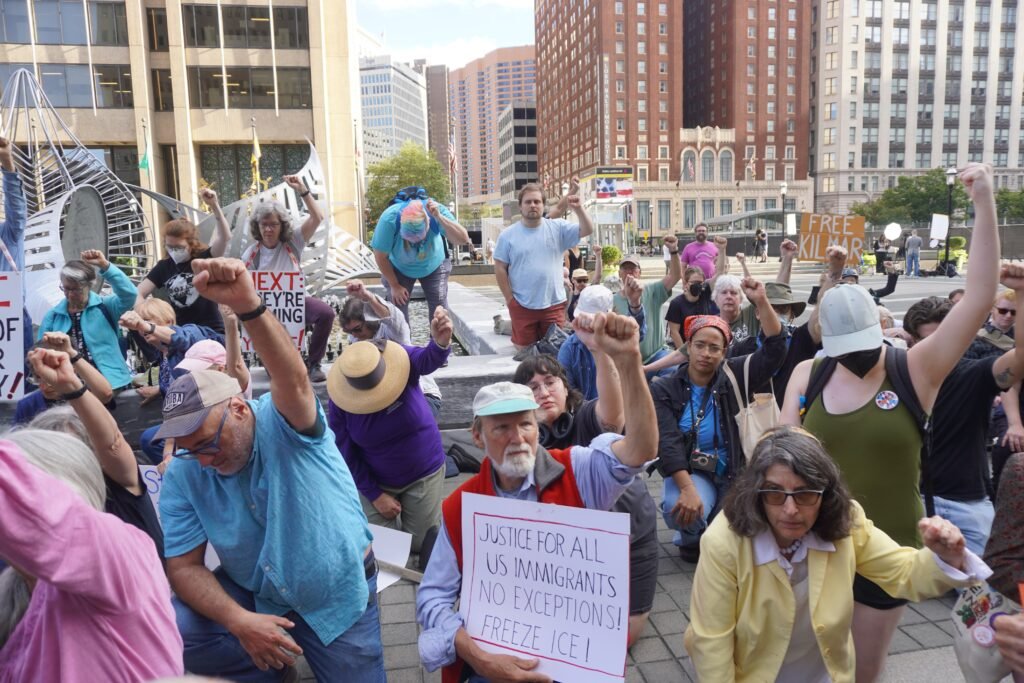On August 25th, a large crowd gathered outside the George H. Fallon Federal Building in Baltimore to show support for Kilmer Abrego Garcia.
In a recent ruling, a federal judge in Maryland, Paula Sinis, prohibited the Trump administration from transporting Kilmer Abrego Garcia again after he was illegally removed earlier this year. This decision will remain in effect until a hearing scheduled for October where evidence will be presented.
Meanwhile, Abrego Garcia has submitted an asylum application, which many view as a long shot, as the Trump administration seeks to deport him to Uganda. Following his illegal deportation, he was placed in a notorious prison in El Salvador back in March. It’s worth noting that Sinis does not have the authority to oversee asylum cases managed by immigration judges.
During the hearing, Sinis indicated that she would issue a temporary restraining order, preventing immigration officials from removing Abrego Garcia until after the decision in October is made.
The upcoming hearing will address Abrego Garcia’s habeas corpus claim, which he is challenging in light of actions taken by U.S. Immigration and Customs Enforcement (ICE) officials.
Sinis mentioned that she plans to decide on the claim within 30 days of the early October hearing.
Current Detention in Virginia
Abrego Garcia was detained on Monday during a face-to-face interview at the ICE office in Baltimore, and is currently held in a Virginia facility, according to his lawyer.
Sinis stated that the temporary restraining order will stipulate that Abrego Garcia must be kept within 200 miles of the District Court in Greenbelt, Maryland.
His legal team is also challenging the government’s attempts to send him to Uganda, citing fears of persecution and harm based on credible interviews.
Individuals facing removal to a third country may contest their deportation if they believe they could suffer in that country.
At Wednesday’s hearing, Justice Department attorney Drew Ensign expressed that a thorough investigation into credible fears might take about two weeks. He also indicated that while the Justice Department opposes Sinis’ temporary orders, they are committed to ensuring Abrego Garcia remains in the U.S. until the habeas corpus claim is resolved.
Controversy Over Deportation
Abrego Garcia’s situation is particularly complex. He was inadvertently deported to El Salvador despite having protections against deportation in 2019, and he was returned to the U.S. in June, facing criminal charges from the Department of Justice.
This case has spotlighted the severe immigration policies during President Trump’s administration. Reports of physical and psychological mistreatment during Abrego Garcia’s incarceration in El Salvador have surfaced, which raises serious concerns.
Last week, his attorneys in a separate criminal case in Nashville mentioned that there were attempts to coerce him into admitting guilt for human smuggling in exchange for a plea that would send him to Costa Rica. If he did not comply, the administration threatened to send him to Uganda instead.
The Costa Rican government has indicated a willingness to accept him as a refugee. According to Abrego Garcia’s attorney Simon Y. Sandoval Moshenberg, he is open to relocating to Costa Rica but is not willing to plead guilty to the charges in Tennessee.
These charges are connected to a 2022 traffic incident, with no claims filed at that time. The Justice Department alleges that he was involved in a long-term conspiracy to smuggle immigrants illegally into the U.S., which he denies.
Additionally, high-profile officials, including Trump and Homeland Security Secretary Christy Noem, have accused him of leading the MS-13 gang, a claim that remains unproven in court.
Having immigrated to the U.S. in 2011 at just 16 years old, Abrego Garcia’s attempts to seek asylum in 2019 were thwarted due to legal deadlines, although he was granted deportation protections due to potential gang violence if he were to return to El Salvador.
At that time, federal immigration officials recognized his risk and did not oppose granting him protections against deportation, understanding that finding safety elsewhere was crucial.







